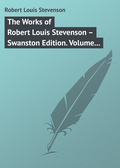
Роберт Льюис Стивенсон
Prince Otto, a Romance
She went to him directly: a beautiful, bright-eyed, and haggard vision; splendidly arrayed and pitifully tattered; the diamond ear-drops still glittering in her ears; and with the movement of her coming, one small breast showing and hiding among the ragged covert of the laces. At that ambiguous hour, and coming as she did from the great silence of the forest, the man drew back from the Princess as from something elfin.
‘I am cold,’ she said, ‘and weary. Let me rest beside your fire.’
The woodman was visibly commoved, but answered nothing.
‘I will pay,’ she said, and then repented of the words, catching perhaps a spark of terror from his frightened eyes. But, as usual, her courage rekindled brighter for the check. She put him from the door and entered; and he followed her in superstitious wonder.
Within, the hut was rough and dark; but on the stone that served as hearth, twigs and a few dry branches burned with the brisk sounds and all the variable beauty of fire. The very sight of it composed her; she crouched hard by on the earth floor and shivered in the glow, and looked upon the eating blaze with admiration. The woodman was still staring at his guest: at the wreck of the rich dress, the bare arms, the bedraggled laces and the gems. He found no word to utter.
‘Give me food,’ said she, – ‘here, by the fire.’
He set down a pitcher of coarse wine, bread, a piece of cheese, and a handful of raw onions. The bread was hard and sour, the cheese like leather; even the onion, which ranks with the truffle and the nectarine in the chief place of honour of earth’s fruits, is not perhaps a dish for princesses when raw. But she ate, if not with appetite, with courage; and when she had eaten, did not disdain the pitcher. In all her life before, she had not tasted of gross food nor drunk after another; but a brave woman far more readily accepts a change of circumstances than the bravest man. All that while, the woodman continued to observe her furtively, many low thoughts of fear and greed contending in his eyes. She read them clearly, and she knew she must begone.
Presently she arose and offered him a florin.
‘Will that repay you?’ she asked.
But here the man found his tongue. ‘I must have more than that,’ said he.
‘It is all I have to give you,’ she returned, and passed him by serenely.
Yet her heart trembled, for she saw his hand stretched forth as if to arrest her, and his unsteady eyes wandering to his axe. A beaten path led westward from the clearing, and she swiftly followed it. She did not glance behind her. But as soon as the least turning of the path had concealed her from the woodman’s eyes, she slipped among the trees and ran till she deemed herself in safety.
By this time the strong sunshine pierced in a thousand places the pine-thatch of the forest, fired the red boles, irradiated the cool aisles of shadow, and burned in jewels on the grass. The gum of these trees was dearer to the senses than the gums of Araby; each pine, in the lusty morning sunlight, burned its own wood-incense; and now and then a breeze would rise and toss these rooted censers, and send shade and sun-gem flitting, swift as swallows, thick as bees; and wake a brushing bustle of sounds that murmured and went by.
On she passed, and up and down, in sun and shadow; now aloft on the bare ridge among the rocks and birches, with the lizards and the snakes; and anon in the deep grove among sunless pillars. Now she followed wandering wood-paths, in the maze of valleys; and again, from a hill-top, beheld the distant mountains and the great birds circling under the sky. She would see afar off a nestling hamlet, and go round to avoid it. Below, she traced the course of the foam of mountain torrents. Nearer hand, she saw where the tender springs welled up in silence, or oozed in green moss; or in the more favoured hollows a whole family of infant rivers would combine, and tinkle in the stones, and lie in pools to be a bathing-place for sparrows, or fall from the sheer rock in rods of crystal. Upon all these things, as she still sped along in the bright air, she looked with a rapture of surprise and a joyful fainting of the heart; they seemed so novel, they touched so strangely home, they were so hued and scented, they were so beset and canopied by the dome of the blue air of heaven.
At length, when she was well weary, she came upon a wide and shallow pool. Stones stood in it, like islands; bulrushes fringed the coast; the floor was paved with the pine needles; and the pines themselves, whose roots made promontories, looked down silently on their green images. She crept to the margin and beheld herself with wonder, a hollow and bright-eyed phantom, in the ruins of her palace robe. The breeze now shook her image; now it would be marred with flies; and at that she smiled; and from the fading circles, her counterpart smiled back to her and looked kind. She sat long in the warm sun, and pitied her bare arms that were all bruised and marred with falling, and marvelled to see that she was dirty, and could not grow to believe that she had gone so long in such a strange disorder.
Then, with a sigh, she addressed herself to make a toilette by that forest mirror, washed herself pure from all the stains of her adventure, took off her jewels and wrapped them in her handkerchief, re-arranged the tatters of her dress, and took down the folds of her hair. She shook it round her face, and the pool repeated her thus veiled. Her hair had smelt like violets, she remembered Otto saying; and so now she tried to smell it, and then shook her head, and laughed a little, sadly, to herself.
The laugh was returned upon her in a childish echo.
She looked up; and lo! two children looking on, – a small girl and a yet smaller boy, standing, like playthings, by the pool, below a spreading pine. Seraphina was not fond of children, and now she was startled to the heart.
‘Who are you?’ she cried hoarsely.
The mites huddled together and drew back; and Seraphina’s heart reproached her that she should have frightened things so quaint and little, and yet alive with senses. She thought upon the birds and looked again at her two visitors; so little larger and so far more innocent. On their clear faces, as in a pool, she saw the reflection of their fears. With gracious purpose she arose.
‘Come,’ she said, ‘do not be afraid of me,’ and took a step towards them.
But alas! at the first moment, the two poor babes in the wood turned and ran helter-skelter from the Princess.
The most desolate pang was struck into the girl’s heart. Here she was, twenty-two – soon twenty-three – and not a creature loved her; none but Otto; and would even he forgive? If she began weeping in these woods alone, it would mean death or madness. Hastily she trod the thoughts out like a burning paper; hastily rolled up her locks, and with terror dogging her, and her whole bosom sick with grief, resumed her journey.
Past ten in the forenoon, she struck a high-road, marching in that place uphill between two stately groves, a river of sunlight; and here, dead weary, careless of consequences, and taking some courage from the human and civilised neighbourhood of the road, she stretched herself on the green margin in the shadow of a tree. Sleep closed on her, at first with a horror of fainting, but when she ceased to struggle, kindly embracing her. So she was taken home for a little, from all her toils and sorrows, to her Father’s arms. And there in the meanwhile her body lay exposed by the highwayside, in tattered finery; and on either hand from the woods the birds came flying by and calling upon others, and debated in their own tongue this strange appearance.
The sun pursued his journey; the shadow flitted from her feet, shrank higher and higher, and was upon the point of leaving her altogether, when the rumble of a coach was signalled to and fro by the birds. The road in that part was very steep; the rumble drew near with great deliberation; and ten minutes passed before a gentleman appeared, walking with a sober elderly gait upon the grassy margin of the highway, and looking pleasantly around him as he walked. From time to time he paused, took out his note-book and made an entry with a pencil; and any spy who had been near enough would have heard him mumbling words as though he were a poet testing verses. The voice of the wheels was still faint, and it was plain the traveller had far outstripped his carriage.
He had drawn very near to where the Princess lay asleep, before his eye alighted on her; but when it did he started, pocketed his note-book, and approached. There was a milestone close to where she lay; and he sat down on that and coolly studied her. She lay upon one side, all curled and sunken, her brow on one bare arm, the other stretched out, limp and dimpled. Her young body, like a thing thrown down, had scarce a mark of life. Her breathing stirred her not. The deadliest fatigue was thus confessed in every language of the sleeping flesh. The traveller smiled grimly. As though he had looked upon a statue, he made a grudging inventory of her charms: the figure in that touching freedom of forgetfulness surprised him; the flush of slumber became her like a flower.
‘Upon my word,’ he thought, ‘I did not think the girl could be so pretty. And to think,’ he added, ‘that I am under obligation not to use one word of this!’ He put forth his stick and touched her; and at that she awoke, sat up with a cry, and looked upon him wildly.
‘I trust your Highness has slept well,’ he said, nodding.
But she only uttered sounds.
‘Compose yourself,’ said he, giving her certainly a brave example in his own demeanour. ‘My chaise is close at hand; and I shall have, I trust, the singular entertainment of abducting a sovereign Princess.’
‘Sir John!’ she said, at last.
‘At your Highness’s disposal,’ he replied.
She sprang to her feet. ‘O!’ she cried, ‘have you come from Mittwalden?’
‘This morning,’ he returned, ‘I left it; and if there is any one less likely to return to it than yourself, behold him!’
‘The Baron – ’ she began, and paused.
‘Madam,’ he answered, ‘it was well meant, and you are quite a Judith; but after the hours that have elapsed, you will probably be relieved to hear that he is fairly well. I took his news this morning ere I left. Doing fairly well, they said, but suffering acutely. Hey? – acutely. They could hear his groans in the next room.’
‘And the Prince,’ she asked, ‘is anything known of him?’
‘It is reported,’ replied Sir John, with the same pleasurable deliberation, ‘that upon that point your Highness is the best authority.’
‘Sir John,’ she said eagerly, ‘you were generous enough to speak about your carriage. Will you, I beseech you, will you take me to the Felsenburg? I have business there of an extreme importance.’
‘I can refuse you nothing,’ replied the old gentleman, gravely and seriously enough. ‘Whatever, madam, it is in my power to do for you, that shall be done with pleasure. As soon as my chaise shall overtake us, it is yours to carry you where you will. But,’ added he, reverting to his former manner, ‘I observe you ask me nothing of the Palace.’
‘I do not care,’ she said. ‘I thought I saw it burning.’
‘Prodigious!’ said the Baronet. ‘You thought? And can the loss of forty toilettes leave you cold? Well, madam, I admire your fortitude. And the state, too? As I left, the government was sitting, – the new government, of which at least two members must be known to you by name: Sabra, who had, I believe, the benefit of being formed in your employment – a footman, am I right? – and our old friend the Chancellor, in something of a subaltern position. But in these convulsions the last shall be first, and the first last.’
‘Sir John,’ she said, with an air of perfect honesty, ‘I am sure you mean most kindly, but these matters have no interest for me.’
The Baronet was so utterly discountenanced that he hailed the appearance of his chaise with welcome, and, by way of saying something, proposed that they should walk back to meet it. So it was done; and he helped her in with courtesy, mounted to her side, and from various receptacles (for the chaise was most completely fitted out) produced fruits and truffled liver, beautiful white bread, and a bottle of delicate wine. With these he served her like a father, coaxing and praising her to fresh exertions; and during all that time, as though silenced by the laws of hospitality, he was not guilty of the shadow of a sneer. Indeed his kindness seemed so genuine that Seraphina was moved to gratitude.
‘Sir John,’ she said, ‘you hate me in your heart; why are you so kind to me?’
‘Ah, my good lady,’ said he, with no disclaimer of the accusation, ‘I have the honour to be much your husband’s friend, and somewhat his admirer.’
‘You!’ she cried. ‘They told me you wrote cruelly of both of us.’
‘Such was the strange path by which we grew acquainted,’ said Sir John. ‘I had written, madam, with particular cruelty (since that shall be the phrase) of your fair self. Your husband set me at liberty, gave me a passport, ordered a carriage, and then, with the most boyish spirit, challenged me to fight. Knowing the nature of his married life, I thought the dash and loyalty he showed delightful. “Do not be afraid,” says he; “if I am killed, there is nobody to miss me.” It appears you subsequently thought of that yourself. But I digress. I explained to him it was impossible that I could fight! “Not if I strike you?” says he. Very droll; I wish I could have put it in my book. However, I was conquered, took the young gentleman to my high favour, and tore up my bits of scandal on the spot. That is one of the little favours, madam, that you owe your husband.’
Seraphina sat for some while in silence. She could bear to be misjudged without a pang by those whom she contemned; she had none of Otto’s eagerness to be approved, but went her own way straight and head in air. To Sir John, however, after what he had said, and as her husband’s friend, she was prepared to stoop.
‘What do you think of me?’ she asked abruptly.
‘I have told you already,’ said Sir John: ‘I think you want another glass of my good wine.’
‘Come,’ she said, ‘this is unlike you. You are not wont to be afraid. You say that you admire my husband: in his name, be honest.’
‘I admire your courage,’ said the Baronet. ‘Beyond that, as you have guessed, and indeed said, our natures are not sympathetic.’
‘You spoke of scandal,’ pursued Seraphina. ‘Was the scandal great?’
‘It was considerable,’ said Sir John.
‘And you believed it?’ she demanded.
‘O, madam,’ said Sir John, ‘the question!’
‘Thank you for that answer!’ cried Seraphina. ‘And now here, I will tell you, upon my honour, upon my soul, in spite of all the scandal in this world, I am as true a wife as ever stood.’
‘We should probably not agree upon a definition,’ observed Sir John.
‘O!’ she cried, ‘I have abominably used him – I know that; it is not that I mean. But if you admire my husband, I insist that you shall understand me: I can look him in the face without a blush.’
‘It may be, madam,’ said Sir John; ‘nor have I presumed to think the contrary.’
‘You will not believe me?’ she cried. ‘You think I am a guilty wife? You think he was my lover?’
‘Madam,’ returned the Baronet, ‘when I tore up my papers, I promised your good husband to concern myself no more with your affairs; and I assure you for the last time that I have no desire to judge you.’
‘But you will not acquit me! Ah!’ she cried, ‘he will – he knows me better!’
Sir John smiled.
‘You smile at my distress?’ asked Seraphina.
‘At your woman’s coolness,’ said Sir John. ‘A man would scarce have had the courage of that cry, which was, for all that, very natural, and I make no doubt quite true. But remark, madam – since you do me the honour to consult me gravely – I have no pity for what you call your distresses. You have been completely selfish, and now reap the consequence. Had you once thought of your husband, instead of singly thinking of yourself, you would not now have been alone, a fugitive, with blood upon your hands, and hearing from a morose old Englishman truth more bitter than scandal.’
‘I thank you,’ she said, quivering. ‘This is very true. Will you stop the carriage?’
‘No, child,’ said Sir John, ‘not until I see you mistress of yourself.’
There was a long pause, during which the carriage rolled by rock and woodland.
‘And now,’ she resumed, with perfect steadiness, ‘will you consider me composed? I request you, as a gentleman, to let me out.’
‘I think you do unwisely,’ he replied. ‘Continue, if you please, to use my carriage.’
‘Sir John,’ she said, ‘if death were sitting on that pile of stones, I would alight! I do not blame, I thank you; I now know how I appear to others; but sooner than draw breath beside a man who can so think of me, I would – O!’ she cried, and was silent.
Sir John pulled the string, alighted, and offered her his hand; but she refused the help.
The road had now issued from the valleys in which it had been winding, and come to that part of its course where it runs, like a cornice, along the brow of the steep northward face of Grünewald. The place where they had alighted was at a salient angle; a bold rock and some wind-tortured pine-trees overhung it from above; far below the blue plains lay forth and melted into heaven; and before them the road, by a succession of bold zigzags, was seen mounting to where a tower upon a tall cliff closed the view.
‘There,’ said the Baronet, pointing to the tower, ‘you see the Felsenburg, your goal. I wish you a good journey, and regret I cannot be of more assistance.’
He mounted to his place and gave a signal, and the carriage rolled away.
Seraphina stood by the wayside, gazing before her with blind eyes. Sir John she had dismissed already from her mind: she hated him, that was enough; for whatever Seraphina hated or contemned fell instantly to Lilliputian smallness, and was thenceforward steadily ignored in thought. And now she had matter for concern indeed. Her interview with Otto, which she had never yet forgiven him, began to appear before her in a very different light. He had come to her, still thrilling under recent insult, and not yet breathed from fighting her own cause; and how that knowledge changed the value of his words! Yes, he must have loved her! this was a brave feeling – it was no mere weakness of the will. And she, was she incapable of love? It would appear so; and she swallowed her tears, and yearned to see Otto, to explain all, to ask pity upon her knees for her transgressions, and, if all else were now beyond the reach of reparation, to restore at least the liberty of which she had deprived him.
Swiftly she sped along the highway, and, as the road wound out and in about the bluffs and gullies of the mountain, saw and lost by glimpses the tall tower that stood before and above her, purpled by the mountain air.
CHAPTER II – TREATS OF A CHRISTIAN VIRTUE
When Otto mounted to his rolling prison he found another occupant in a corner of the front seat; but as this person hung his head and the brightness of the carriage lamps shone outward, the Prince could only see it was a man. The Colonel followed his prisoner and clapped-to the door; and at that the four horses broke immediately into a swinging trot.
‘Gentlemen,’ said the Colonel, after some little while had passed, ‘if we are to travel in silence, we might as well be at home. I appear, of course, in an invidious character; but I am a man of taste, fond of books and solidly informing talk, and unfortunately condemned for life to the guard-room. Gentlemen, this is my chance: don’t spoil it for me. I have here the pick of the whole court, barring lovely woman; I have a great author in the person of the Doctor – ’
‘Gotthold!’ cried Otto.
‘It appears,’ said the Doctor bitterly, ‘that we must go together. Your Highness had not calculated upon that.’
‘What do you infer?’ cried Otto; ‘that I had you arrested?’
‘The inference is simple,’ said the Doctor.
‘Colonel Gordon,’ said the Prince, ‘oblige me so far, and set me right with Herr von Hohenstockwitz.’
‘Gentlemen,’ said the Colonel, ‘you are both arrested on the same warrant in the name of the Princess Seraphina, acting regent, countersigned by Prime Minister Freiherr von Gondremark, and dated the day before yesterday, the twelfth. I reveal to you the secrets of the prison-house,’ he added.
‘Otto,’ said Gotthold, ‘I ask you to pardon my suspicions.’
‘Gotthold,’ said the Prince, ‘I am not certain I can grant you that.’
‘Your Highness is, I am sure, far too magnanimous to hesitate,’ said the Colonel. ‘But allow me: we speak at home in my religion of the means of grace: and I now propose to offer them.’ So saying, the Colonel lighted a bright lamp which he attached to one side of the carriage, and from below the front seat produced a goodly basket adorned with the long necks of bottles. ‘Tu spem reducis– how does it go, Doctor?’ he asked gaily. ‘I am, in a sense, your host; and I am sure you are both far too considerate of my embarrassing position to refuse to do me honour. Gentlemen, I drink to the Prince!’
‘Colonel,’ said Otto, ‘we have a jovial entertainer. I drink to Colonel Gordon.’
Thereupon all three took their wine very pleasantly; and even as they did so, the carriage with a lurch turned into the high-road and began to make better speed.
All was bright within; the wine had coloured Gotthold’s cheek; dim forms of forest trees, dwindling and spiring, scarves of the starry sky, now wide and now narrow, raced past the windows, through one that was left open the air of the woods came in with a nocturnal raciness; and the roll of wheels and the tune of the trotting horses sounded merrily on the ear. Toast followed toast; glass after glass was bowed across and emptied by the trio; and presently there began to fall upon them a luxurious spell, under the influence of which little but the sound of quiet and confidential laughter interrupted the long intervals of meditative silence.
‘Otto,’ said Gotthold, after one of these seasons of quiet, ‘I do not ask you to forgive me. Were the parts reversed, I could not forgive you.’
‘Well,’ said Otto, ‘it is a phrase we use. I do forgive you, but your words and your suspicions rankle; and not yours alone. It is idle, Colonel Gordon, in view of the order you are carrying out, to conceal from you the dissensions of my family; they have gone so far that they are now public property. Well, gentlemen, can I forgive my wife? I can, of course, and do; but in what sense? I would certainly not stoop to any revenge; as certainly I could not think of her but as one changed beyond my recognition.’
‘Allow me,’ returned the Colonel. ‘You will permit me to hope that I am addressing Christians? We are all conscious, I trust, that we are miserable sinners.’
‘I disown the consciousness,’ said Gotthold. ‘Warmed with this good fluid, I deny your thesis.’
‘How, sir? You never did anything wrong? and I heard you asking pardon but this moment, not of your God, sir, but of a common fellow-worm!’ the Colonel cried.
‘I own you have me; you are expert in argument, Herr Oberst,’ said the Doctor.
‘Begad, sir, I am proud to hear you say so,’ said the Colonel. ‘I was well grounded indeed at Aberdeen. And as for this matter of forgiveness, it comes, sir, of loose views and (what is if anything more dangerous) a regular life. A sound creed and a bad morality, that’s the root of wisdom. You two gentlemen are too good to be forgiving.’
‘The paradox is somewhat forced,’ said Gotthold.
‘Pardon me, Colonel,’ said the Prince; ‘I readily acquit you of any design of offence, but your words bite like satire. Is this a time, do you think, when I can wish to hear myself called good, now that I am paying the penalty (and am willing like yourself to think it just) of my prolonged misconduct?’
‘O, pardon me!’ cried the Colonel. ‘You have never been expelled from the divinity hall; you have never been broke. I was: broke for a neglect of military duty. To tell you the open truth, your Highness, I was the worse of drink; it’s a thing I never do now,’ he added, taking out his glass. ‘But a man, you see, who has really tasted the defects of his own character, as I have, and has come to regard himself as a kind of blind teetotum knocking about life, begins to learn a very different view about forgiveness. I will talk of not forgiving others, sir, when I have made out to forgive myself, and not before; and the date is like to be a long one. My father, the Reverend Alexander Gordon, was a good man, and damned hard upon others. I am what they call a bad one, and that is just the difference. The man who cannot forgive any mortal thing is a green hand in life.’
‘And yet I have heard of you, Colonel, as a duellist,’ said Gotthold.
‘A different thing, sir,’ replied the soldier. ‘Professional etiquette. And I trust without unchristian feeling.’
Presently after the Colonel fell into a deep sleep and his companions looked upon each other, smiling.
‘An odd fish,’ said Gotthold.
‘And a strange guardian,’ said the Prince. ‘Yet what he said was true.’
‘Rightly looked upon,’ mused Gotthold, ‘it is ourselves that we cannot forgive, when we refuse forgiveness to our friend. Some strand of our own misdoing is involved in every quarrel.’
‘Are there not offences that disgrace the pardoner?’ asked Otto. ‘Are there not bounds of self-respect?’
‘Otto,’ said Gotthold, ‘does any man respect himself? To this poor waif of a soldier of fortune we may seem respectable gentlemen; but to ourselves, what are we unless a pasteboard portico and a deliquium of deadly weaknesses within?’
‘I? yes,’ said Otto; ‘but you, Gotthold – you, with your interminable industry, your keen mind, your books – serving mankind, scorning pleasures and temptations! You do not know how I envy you.’
‘Otto,’ said the Doctor, ‘in one word, and a bitter one to say: I am a secret tippler. Yes, I drink too much. The habit has robbed these very books, to which you praise my devotion, of the merits that they should have had. It has spoiled my temper. When I spoke to you the other day, how much of my warmth was in the cause of virtue? how much was the fever of last night’s wine? Ay, as my poor fellow-sot there said, and as I vaingloriously denied, we are all miserable sinners, put here for a moment, knowing the good, choosing the evil, standing naked and ashamed in the eye of God.’
‘Is it so?’ said Otto. ‘Why, then, what are we? Are the very best – ’
‘There is no best in man,’ said Gotthold. ‘I am not better, it is likely I am not worse, than you or that poor sleeper. I was a sham, and now you know me: that is all.’
‘And yet it has not changed my love,’ returned Otto softly. ‘Our misdeeds do not change us. Gotthold, fill your glass. Let us drink to what is good in this bad business; let us drink to our old affection; and, when we have done so, forgive your too just grounds of offence, and drink with me to my wife, whom I have so misused, who has so misused me, and whom I have left, I fear, I greatly fear, in danger. What matters it how bad we are, if others can still love us, and we can still love others?’
‘Ay!’ replied the Doctor. ‘It is very well said. It is the true answer to the pessimist, and the standing miracle of mankind. So you still love me? and so you can forgive your wife? Why, then, we may bid conscience “Down, dog,” like an ill-trained puppy yapping at shadows.’
The pair fell into silence, the Doctor tapping on his empty glass.
The carriage swung forth out of the valleys on that open balcony of high-road that runs along the front of Grünewald, looking down on Gerolstein. Far below, a white waterfall was shining to the stars from the falling skirts of forest, and beyond that, the night stood naked above the plain. On the other hand, the lamp-light skimmed the face of the precipices, and the dwarf pine-trees twinkled with all their needles, and were gone again into the wake. The granite roadway thundered under wheels and hoofs; and at times, by reason of its continual winding, Otto could see the escort on the other side of a ravine, riding well together in the night. Presently the Felsenburg came plainly in view, some way above them, on a bold projection of the mountain, and planting its bulk against the starry sky.
‘See, Gotthold,’ said the Prince, ‘our destination.’
Gotthold awoke as from a trance.
‘I was thinking,’ said he, ‘if there is any danger, why did you not resist? I was told you came of your free will; but should you not be there to help her?’
The colour faded from the Prince’s cheeks.







